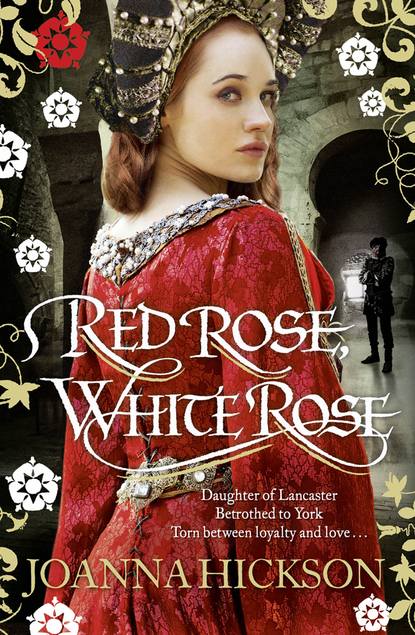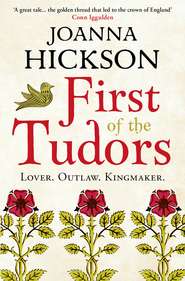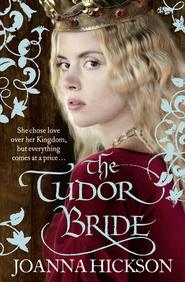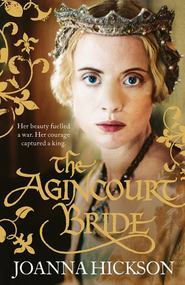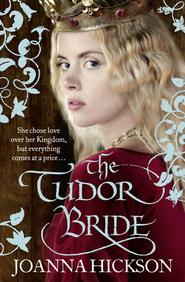По всем вопросам обращайтесь на: info@litportal.ru
(©) 2003-2024.
✖
Red Rose, White Rose
Настройки чтения
Размер шрифта
Высота строк
Поля
The candle I had been left with had begun to gutter and I was steeling myself to contemplate the long darkness of the night when I heard that unnerving scrunch again.
‘May I come in, Lady Cicely?’ said the now-familiar voice of my knightly abductor. ‘I would speak with you.’
I rose hastily to my feet, stumbling forward on stiffened limbs but preferring to converse on equal terms with my captor. ‘Enter, Sir John,’ I said, arranging my face into what I hoped was an implacable expression, while inside my stomach churned with apprehension.
He was carrying a lighted lantern and a tray containing a bowl and a jug. ‘I noticed that you ate little at dinner, Lady Cicely. I have brought you curds and honey and some ale because I must warn you that we will be going on a journey. When the castle is sleeping I intend to take you on a ride which I hope will make you understand the injustice that has been done to my brother.’
It was as if my prayers had been answered. My chances of making a break for freedom were infinitely higher if I were taken out of the castle, but I did not want him to notice my surge of elation so I kept my expression blank.
‘Thank you for the warning, Sir John. I am agog to learn how you think to change my perception.’
His grey eyes studied my face but their narrow gaze gave me no hint of his intentions. ‘As I said, I plan to show you injustice, my lady. Now you should get some sleep. Be ready to ride before first light.’ He said no more but he left me the tray and the lantern.
When I lay down sleep eluded me but a vivid memory rose to the surface of my mind like a waking dream. My father sat in his canopied chair, his bandaged leg propped up on cushions before him. Although only nine years old I knew there was an evil presence hidden under that thick dressing, which drew him daily nearer to death. Cuddy had told me that an old wound, received many years before, had resurfaced and now festered, sending rays of blackened flesh creeping up his thigh which emitted a putrid smell and warned us all that the great man had little time left.
For this important occasion maids had dressed me in my best pink gown; tiny white roses decorated the skirt and sleeves. I understood the meaning of betrothal and so did the boy beside me – Richard Plantagenet, dressed in the York colours of dark murrey-red and blue. He was thirteen and looked rather sulky, perhaps because although four years younger, I already stood nearly as tall as he.
My father’s voice was mellow, despite the pain that etched deep furrows in his brow. ‘Your vows to marry give me much pleasure, my children. I hope you will honour each other and share a mutual affection. We have done our best to teach you how.’ He exchanged glances with my mother, who stood at his shoulder, beautiful in her sky-blue robe, her high, white forehead framed by a winged structure of pale gauze and gold filigree. She motioned us to kneel.
‘We seek your blessing, my lord,’ said Richard in a well-rehearsed sing-song tone, and took my hand in a moist clasp.
‘May God in his infinite mercy bless you both,’ pronounced my father, his voice carrying to the crowd of retainers and servants assembled below the great hall dais. ‘And when the time comes may he grant you the boon of children to unite the blood of York and Neville.’
I felt the betrothal ring bite into the sides of my fingers as Richard’s grip tightened and we both flushed with embarrassment. The mention of children evoked the notion of coupling – anathema to our childish sensitivities even though we both knew it was part of the marriage contract. There would have to be coupling – but not yet.
Minstrels struck up a lively tune and the Master of Revels took us off to lead the dancing. The great Raby Baron’s Hall was decked with flowers and ribbons tied into love knots and above them rows of brightlycoloured ancestral banners hung from the rafters. I enjoyed dancing and smiled as I executed the intricate steps of the estampie, a new French dance which I had just learned, but my mind was still filled with concern for my father. When the music ended I went to pick up the jewelled hanap on the table beside him, kept exclusively for the earl to drink from. I lifted the cover and carefully held it beneath the vessel to catch any drips as my father drank. He returned the precious vessel to my hands with a smile.
‘You play the cupbearer well, Cicely,’ he said.
‘You know I love to serve you, my lord father,’ I told him in a whisper. ‘I wish I could ease your pain.’
‘I feel no pain when I look at you, sweeting. You are my solace and my hope. Look – what does it say up there, under the ship on the great pennant?’ He pointed to the huge gold and crimson fretted battle standard which dominated the parade of banners in the rafters. In the centre, superimposed over the Neville saltire, was the black outline of a ship in sail, symbolizing the fleet commanded by Admiral Neuville which had brought the Conqueror’s army to England. The motto read Esperance me confort – ‘Hope comforts me.’
I spoke the words to him carefully, knowing them by heart.
‘You are my hope, Cicely,’ he said, his eyes holding mine. ‘You are the one …’
The image was so vivid that when I opened my eyes I thought I could still see my father’s grey gaze fixed on mine. Then I realized it was not memory but reality. Sir John was leaning over me with a lamp and his eyes were the re-incarnation of those that my mind had conjured up, even flecked with the same colours of chestnut and green as my father’s had been.
He spoke in a hushed whisper, as if afraid to wake the rest of the castle inhabitants. ‘We leave now, Lady Cicely, before it gets light. You must come.’
I threw off the covers and stood up, feeling suddenly dizzy so that I swayed on my feet. Sir John took my arm to steady me and for a few moments I found myself leaning against him with a rush of emotion that I could not put a name to. Then I realized we were not alone and hastily drew back. The stolid maid stood behind him and it was she who pulled my discarded riding huke over my head and laced up my boots. By the time I was ready the dizziness had passed and we crept quietly from the chamber and down the narrow stair. I cast a glance back at my prison and put up a silent prayer of thanks to St Agnes for my deliverance. I had no idea where I was going but surely anywhere had to be better than that cold, lonely cell?
A rear exit from Brancepeth opened onto a path leading directly down into the densely wooded dene on which the castle stood. My sturdy palfrey slipped and scrambled down the steep bank with remarkable agility while I clung to the saddle and left him to it. We then followed the course of a shallow but fast-flowing stream which our horses seemed to navigate more by feel than sight.
There were five of us mounted and one loaded pack pony; I recognized the two squires who had both been in the hall at dinner the previous night; Lady Westmorland’s son Tam Clifford I knew from my spurious ‘rescue’ and the other I had gathered was Sir John’s younger brother, Thomas. The fifth rider was the stolid maid who turned out to be called Marion, brought along I assumed because Sir John’s sense of honour would not allow me to be in the company of three men without a female chaperone, for which, had she known it, my mother would certainly have been grateful.
For the first mile the only sound to be heard was the splashing of the horses’ feet in the water and the occasional screech of a hoof slipping on rock, when we all held our breath. No one spoke, knowing that the Raby observers were camped within earshot above us on the flat land in front of the castle. For an instant I wondered if a cry for help would bring them running but then I realized there would likely be bloodshed and I did not want to be responsible for any death or injury. I was determined that this situation should be resolved peacefully and without bloodshed. The only thing I had not decided was how.
Once clear of the dene I ventured to speak. ‘May I now ask where we are going?’
Dawnlight had begun to flush the eastern sky and the castle had disappeared into the forest gloom behind us. Sir John had carefully dropped back beside me leaving Tam in front and Thomas behind Marion, leading the sumpter. Even if I spotted a possible escape route, the knight’s sleek charger would easily outrun my serviceable steed.
‘As I told you, Lady Cicely, I am going to show you the true injustice of your father’s legacy. We will ford the river you can see ahead and then we will cut across open country, avoiding several villages before we reach our destination. So there will be no opportunity for you to seek assistance, should you have it in mind.’
I made no response but kept a keen eye on our surroundings. I had enough local knowledge to guess that the river we crossed, wading hock-high through the spring-swelled flow, was once again the Wear and with the sun rising to our left we must be heading south. I guessed that Raby stood somewhere towards the west but how far and over what terrain? Although I harboured a spirit of adventure and believed I could elude recapture if the right circumstances arose, I felt daunted by the notion of making my way there alone across open country. In the anonymity of the surrounding moorland it would be easy to follow the wrong stream and become hopelessly lost.
At high noon in uncommonly bright spring sunshine we sighted our destination when a dark silhouette appeared on the horizon like a stump protruding from the earth. At that point we entered treacherous terrain where the going was flat and sinister, reeking with the stench of stagnant water and covered in a warning carpet of moss and myrtle. A moist humidity clung to it, producing swarms of biting flies which we swatted irritably as we followed a series of tall marker sticks sunk into the soggy morass to show where the ground was firm enough to take the weight of our horses. The stump gradually resolved into a grey stone edifice about thirty feet high, topped by uneven gap-toothed crenellations and standing square on a rocky mound attended by a huddle of low, straw-thatched hovels and a small stone chapel. A fearsome iron yett secured the ground floor and a random succession of tiny, deep-set windows pierced the thick stone walls of the tower, providing maximum defence but minimum light to the upper stories. It was what northerners called a peel, built to repel marauding reivers but offering nothing in the way of domestic comfort. I could barely suppress a shiver, imagining my next confinement in the grim twilight of an upper chamber, set in the middle of a stinking bog.
We had been riding slowly and carefully in single file, picking our way gingerly over the untrustworthy moss, but when we finally reached secure rock Sir John kicked his horse up to mine. ‘This is what I wanted you to see, Lady Cicely. Thanks to your father, this dank place is where my brother Thomas will have to bring his bride, should we ever find him one willing to make it her home. Welcome to Aycliffe Tower.’
6 (#ulink_42b1ffab-4167-5cd4-b5e5-3eef3293e360)
Aycliffe Tower
Cicely
The squat tower seemed to rise out of a deep tangle of briars, which at this early spring season were just beginning to hide their fierce thorns behind emerging green shoots. Someone had struck on the ingenious idea of planting wild roses in the sparse patches of soil that littered the rocky foundations and these now formed a dense, flesh-ripping defence against any enemy attempt to scale the walls. Only the entrance to the undercroft, guarded by its latticed yett and a pair of thick iron-bound oak gates, remained free of this thorny barricade so that both people and animals could speedily take refuge in an attack. Gazing at these impenetrable thickets of briars my first random thought was to wonder whether they bloomed red or white. The red rose was one of the symbols of the Royal House of Lancaster, loyally supported by all branches of the Neville family, ever since my father had changed his allegiance from King Richard to King Henry. Planted here in Lancastrian-held soil by a Lancastrian vassal, it occurred to me that it would be ironic if, when they flowered in June, these defensive English roses were not red but white.
After struggling with a gargantuan lock and key, Tam and Thomas managed to get the yett and the gates open, but in order to reach the narrow tower stair we were obliged to cross the lower chamber, where until very recently a herd of cows had wintered. As a result the earth floor was still mired with their excrement so that our boots and the hem of my skirt quickly became filthy. I shut my mind to the stench and the image of rats scuttling over my feet and headed for the stair.
The upper floor was divided into two chambers, the first furnished with a few rickety benches and a heap of grubby sleeping mats piled in one corner. There was a cold, ash-filled fireplace in one wall. The deep gloom was preserved by tightly closed shutters; these Tam hastened to throw open, allowing welcome light and air through the two small window holes, but the smell of cattle dung still clung with fierce pungence and I clamped my hand over my mouth to stop myself gagging. Bidding me to duck my head, Sir John ushered me through a low door in the rough stone dividing-wall which led into another room containing a settle placed opposite another dead hearth and a low bedstead which lacked any mattress.
Eying this, I asked coldly, ‘Is it part of your plan, that I should sling myself on the bed-ropes to sleep, Sir John?’
‘We have brought mattress bags,’ he replied with a hint of a smile. ‘I will have Thomas send villeins out to fill them with myrtle leaves. They make fragrant bedding.’
‘I must take your word for that. Until I came to Brancepeth I had never slept on anything but feathers.’
‘Perhaps then you will begin to understand the difference between a castle and a hovel.’
‘I might, but I do not see how that will make me favour your cause.’ I shot him a sceptical glance.
Ignoring this challenge, Sir John removed a large iron key from the lock in the heavy door to the chamber and held it aloft while he spoke crisply and concisely. ‘You will sleep in here, the maid where you will. Tam and Thomas and I will sleep in the room above. There will be no keys but there will be a constant guard on the yett and a watch on the tower roof. Otherwise you are free to roam. The guard will not stop you but I do not advise trying to venture beyond the perimeter of the policies, due to the surrounding bog. Whole oxen have been swallowed by it in the past, when they strayed too close to the edge. The path is marked as you saw but the posts are removed at night. Only the reeve knows the safe route. Now I have arrangements to make. A meal will be served very soon. I hope you will join us.’
With a small bow he left the room, closing the door behind him. True to his word there was no dreaded sound of the key in the lock. I stared after him, trying to fathom his intentions in bringing me to this cheerless, dank little tower. To change my view of the Neville family feud?
The promised ‘meal’ was day-old bread, hard cheese and raw onion served on a trestle table. The men had removed their gambesons and boots and sat comfortably in tunic and hose, pointedly discussing Thomas’ inheritance.
Tam Clifford was succinct in his assessment of Aycliffe. ‘This place is a dump,’ he said. ‘What are you going to do about it, Thomas?’
Thomas pursed his lips. ‘I really do not know. I will have to win some big prizes at tournaments when I am knighted, if I am to build new domestic quarters.’
With a sly glance at me, Sir John remarked, ‘In any case it is no place to rear a family. Bogs may be a good defence against reivers but children do not thrive in them.’
‘True,’ Thomas drawled, downcast. Then, with a cheeky look at his brother, ‘John, you do not seem to be in any hurry to marry. If you are not going to take possession of the constable’s quarters at Barnard, perhaps I should move in there.’
It was news to me that Sir John was Constable of Barnard Castle, a royal stronghold not far from Raby. I supposed the post was connected to the earldom and had gone to the Brancepeth branch of the family.





